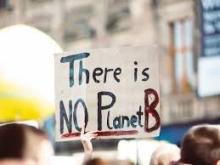
After decades of failure to stop emissions rising, a landmark new report released Monday from the United Nations’ climate-science body warns that the impacts of climate change are here and now humans need to accelerate efforts to adapt.
“It is unequivocal that climate change has already disrupted human and natural systems,” states the report’s summary for policymakers.
The next decade will prove a crucial test of whether the world can move fast enough to implement plans to adapt to this increasingly complex challenge. “Any further delay in concerted anticipatory global action on adaptation and mitigation will miss a brief and rapidly closing window of opportunity to secure a livable and sustainable future for all,” the report says.
The report, produced by the U.N. Intergovernmental Panel on Climate Change (IPCC), comes as part of the agency’s most comprehensive assessment on climate change since 2014. It’s the second of three planned reports, the first of which was released in August 2021 and made clear the world was on track to surpass 1.5°C of warming, a threshold widely considered likely to trigger catastrophic and irreversible effects.
Typically, policymakers divide climate policy into two categories: adaptation and mitigation. Mitigation incorporates all the actions that can reduce emissions and thus limit future damage, while adaptation covers how we prepare ourselves and adjust to a warmer world. For decades, mitigation has received the lion’s share of attention from scientists, activists, and policymakers—and funding—for an obvious reason: more mitigation means less need for adaptation down the road.
The new IPCC report is a signal of how dramatically that thinking has changed. “For too long, there was concern among many in the climate community that highlighting the acute need for investment in adaptation would undermine the importance of reducing emissions,” says Nat Keohane, president of the Center for Climate and Energy Solutions. This “report should put that debate to rest for good.” The truth is we need both—and urgently.
At the root of that urgency are the clear damages already harming not just human society but also natural ecosystems. Coral reefs and forested areas, including in the Amazon, are among the ecosystems that face the threat of catastrophic climate tipping points—after which the impacts are irreversible—without a clear pathway to restoration. This in turn shapes human civilization both because locals depend on these ecosystems for everything from food to clean air and because they hold carbon that would otherwise enter the atmosphere and worsen global warming.
Humans are generally better able to adapt than natural ecosystems, the report says, but nonetheless many communities are running up against their limits to sustain human life. Adaptation cannot prevent all losses and damages—there are some negative impacts of climate that the world simply will not be able to prevent. And not every community will be able to adapt or respond the same way. “There are limits to adaptation,” says Adelle Thomas, a researcher at Climate Analytics and one of the new IPCC report’s many contributing authors. “We are already finding that while some people and places are adapting, they are being pushed beyond their abilities to adapt.”
Among the most vulnerable are people living in low-lying coastal regions such as those in Australasia; residents of small islands such as those in Micronesia; and smallholder farmers around the world. Investing in adaptation projects can help not only protect people from climate impacts, but also improve agricultural productivity and provide food security, protect human health and well-being, and safeguard livelihoods. But to do this successfully, more financing is needed to tackle what the report calls a growing “adaptation gap” between those who can afford to invest in sometimes costly adaptation projects and those who may not be able to.
And, if not done properly, “maladaptation” risks locking communities into even greater climate vulnerability, at an even higher cost, further exacerbating existing inequalities. “The science could not be more clear,” says Tina Stege, climate envoy for the Marshall Islands. “Failing to adapt to this crisis will cost lives. Failing to provide fair, accessible climate finance will cost lives. Continued dependence on fossil fuels will cost lives. With the consequences of inaction spelled out so clearly, yet again, a failure to act is inhuman and unconscionable.”
